
Ask DadPad, Long Read, Parenting Advice, Sleep
Ask DadPad: Why won’t my newborn sleep through the night?!
Posted on 31st July 2020
Today, as part of our #AskDadPad series – giving you the heads up on all aspects of what ‘being a dad’ is really about – we’re taking a look at all things sleep. One of the most popular, often fraught and sometimes heated topics of discussion amongst parents-to-be and new parents, sleep – or the lack of it – will fast become one of your biggest obsessions as you get to grips with being a new dad.
To help you out, we’ve spoken to two sleep experts – Mandy Gurney, from the Millpond Sleep Clinic in London, and Jane Armstrong, from the Hunrosa Sleep Clinic here in Cornwall – to give you an insight into how your newborn baby ‘works’ in terms of sleep, so that you are able to build realistic expectations. They’ve also shared with us their core tips on how to survive those first 12 weeks.
Sleep safety is also of paramount importance, so we’re also going to look at the key safe sleep practice advice out there.
“Is she a good baby?”
It’s probably one of the questions that you’ll be asked as a new father – but what this person is really asking you is: “Does she sleep?”. This question is problematic for so many reasons:
- Firstly, it’s making the assumption that baby’s ability to sleep through the night – or not – is within her control
- Secondly, it’s suggesting that the baby is being wilfully ‘naughty’ by not sleeping in the way that we, as full-grown adults, do
- And thirdly, it’s unhelpfully giving you the impression that there are babies out there who are good and who do sleep well
As an overwhelmed and exhausted father, suffering with sleep deprivation and all the other stresses of having a tiny baby at home, it’s the last thing you want to hear! What’s going to be much more useful for you is to understand:
- why your baby is not likely to sleep for any lengthy stretch of time for a good few weeks;
- that what she’s doing is completely natural; and
- how you can best cope in the meantime.
The fourth trimester
As we explain in the DadPad app, your baby has taken nine months to develop in mum’s womb. These nine months are usually split into three separate stages of development of three months each, known as trimesters.

Once baby has been born, she will then usually take another three months to get used to being in the outside world. Inside the womb, she was comfortable and safe, used to the constant movement and ‘white noise’. She would have experienced mainly darkness, a constantly-maintained body temperature, and the sensation of being continuously held and touched, with food on tap. She would have felt connected to her mum, hearing her heartbeat and your voices, and would never have felt alone.
Mandy comments:
In the dark environment of the womb, babies do not have the benefit of light to signal the difference between night and day. Research has shown that, for the majority of… pregnancy, your baby will be asleep. It is not until… [the third] trimester that your baby will have some brief periods of two or three hours per day, awake.
Suddenly, though, following birth, she’s out in the open, in a completely alien environment. It’s going to be totally natural for her to need to feed every few hours, to want to sleep near both of you, and to not want to be put down in those early days and weeks. This is simply her survival instinct kicking in. Once you realise this, you’ll hopefully be able to empathise with her ‘behaviour’ a little more, and this will also make your life easier, as you adjust your expectations of what she will or won’t ‘do’.
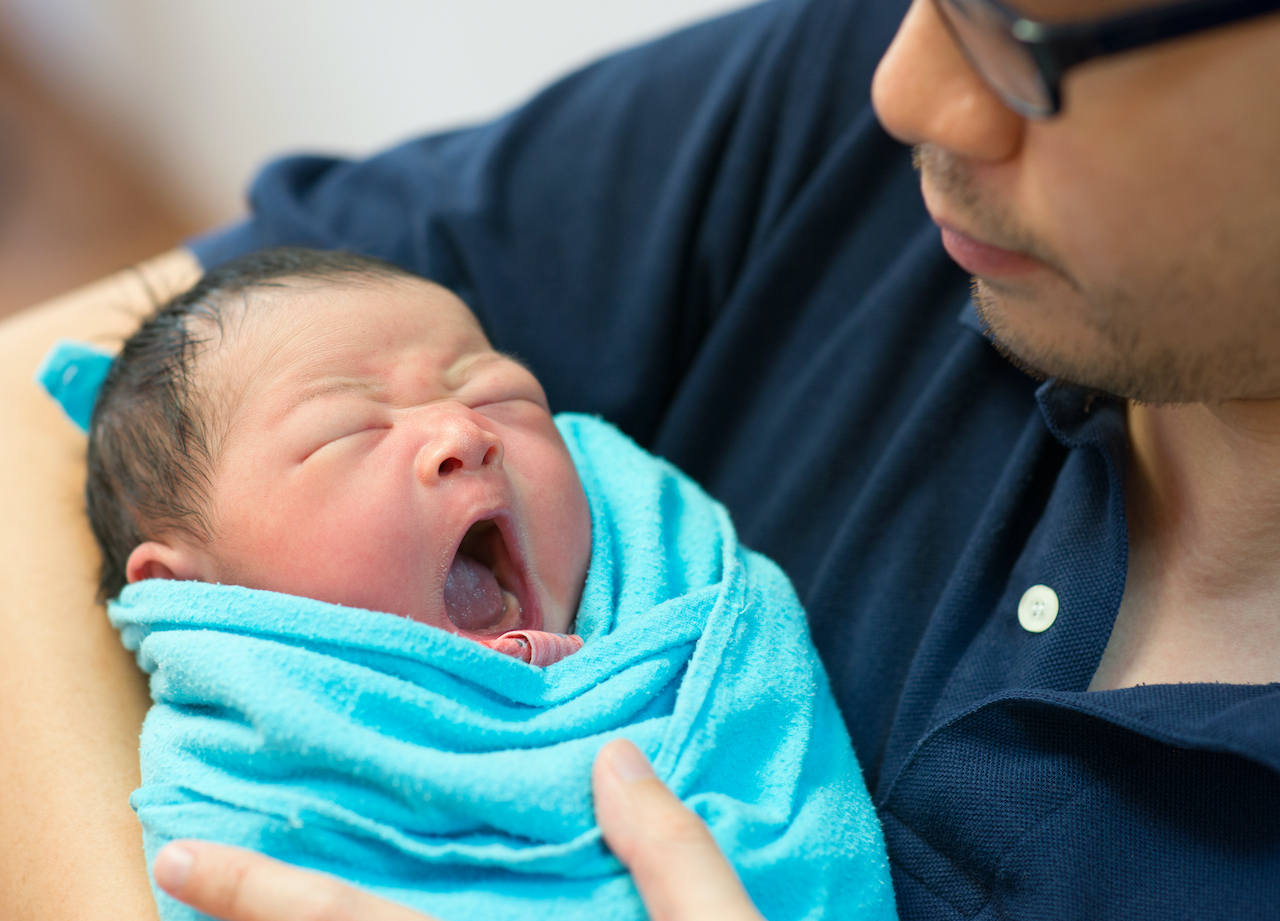
Baby’s sleep patterns
Mandy describes babies’ first sleep patterns:
Young babies have completely different sleep phases and schedules to us, and generally unpredictable sleep habits. As they mature, their sleep changes in terms of how much they need and how it is structured over a 24-hour period. Being aware of this difference helps parents know what to expect.
Newborn babies will sleep for around 16-18 hours, in total, each day. This sleep is likely to be split almost equally between daytime sleep and night-time sleep in the early days, and will be taken in short bursts.
Unlike older children and adults, babies wake very easily because, as Jane explains:
…[babies] spend a large proportion of their day in REM sleep. REM sleep is a light sleep state, displaying fluttering eyelids; rapid, irregular breathing; occasional body movements; and grunts or brief cries.
As baby grows, her sleep pattern will continue to change. For example, by around four weeks, she can be sleeping for around 14 hours a day – although some babies will be sleeping for just nine hours, whilst others may be asleep for nearer 19 hours. The important thing to remember is that all babies are different, and that there is no ‘right’ or ‘wrong’ amount.

Circadian rhythm
Another important ‘skill’ that your new baby will have to learn is to differentiate between day and night. As an adult, the timing of our sleep is governed by circadian (pronounced SIR-KAY-DEE-UN) rhythm. As defined by The Sleep Foundation, this is:
…basically a 24-hour internal clock that is running in the background of your brain and cycles between sleepiness and alertness at regular intervals. It’s also known as your sleep/wake cycle… A part of your hypothalamus (a portion of your brain) controls your circadian rhythm. That said, outside factors like lightness and darkness can also impact it. When it’s dark at night, your eyes send a signal to the hypothalamus that it’s time to feel tired. Your brain, in turn, sends a signal to your body to release melatonin, [a hormone] which makes your body tired. That’s why your circadian rhythm tends to coincide with the cycle of daytime and nighttime.
Research has shown that it’s “prominently our exposure to light” that governs our circadian rhythm: “Bright sunlight in the morning to kick start it, dim light in the evening. This dimming light helps our bodies produce melatonin, the hormone that supports us to get to sleep.” [Jane Armstrong]
Newborn sleep, though, is not governed by circadian rhythm. In the womb, it was the movement of mum’s body and the production of melatonin from within her, received by baby via the placenta, that helped her to regulate her sleep. This has now all gone, the hormonal connection to mum having been broken, and she’ll need to learn how to do all this for herself:
Your newborn must develop both her own body clock and start her own hormone production. This takes place during the first three to four months and, until then, her nights and days will simply blend together with sleep being governed by your baby’s need to feed. [Mandy Gurney]
This new development is “further complicated by the fact that newborns need to feed every few hours. As a result, newborn sleep episodes tend to be brief, and spaced at fairly regular intervals around the clock.” [Jane Armstrong]
Learning when the ‘right’ time to sleep is, getting her brain to develop its own circadian rhythm of hormone production, and growing a tummy that’s big enough to store larger amounts of food all takes time – usually up to about 12 weeks – and therefore the only thing that you can do as a new parent is just allow her the time to do that.
That doesn’t mean that it’s going to be easy for you, though, as surviving with a lack of sleep is a huge challenge. However, some of these tips from Mandy, Jane and us here at DadPad might help…
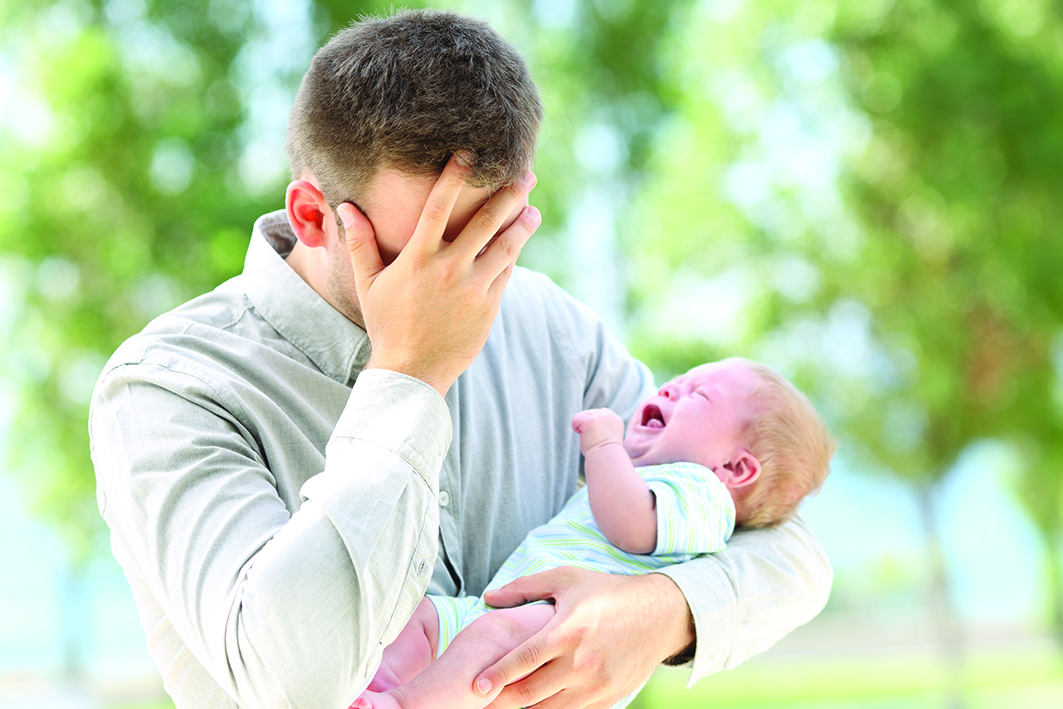
Surviving the first 12 weeks with a newborn:
- Grab opportunities to sleep whilst you can – “sleep when baby sleeps” is an old adage that you’ll probably hear at some point in your fatherhood journey. Whilst it’s not always possible (especially if you’ve also got other children), and it won’t usually enable you to completely make up for the lack of sleep that you’ve accrued since baby was born, a quick nap here and there might just be enough to keep you perked up and ready for the next few hours. Jane tells us that, “if you are sleep deprived, the brain compensates by rendering naps more restorative than usual”, with Mandy adding that a “nap of very light first stage sleep will probably make you feel less tired and even three minutes of deeper sleep can have recuperative effects.”
- Accept offers of help from others – it will definitely help both you and baby’s mum if you accept offers of support in the first few weeks, even if it’s just to make you a cup of tea. Getting help with the cleaning, cooking, shopping and other household jobs will allow you to focus on looking after baby and each other – and that includes having a rest where you can get it. If you’ve got an older child, try and arrange for a friend or family member to pick him up from school or nursery some days, so you get more opportunities to rest. Mandy also advises that “a local parents’ support group could be an invaluable place to share tips and find sympathetic ears.”
- Don’t be afraid to turn visitors away – lots of people will want to come and visit you in the first days and weeks after baby is born, and most will want the opportunity to see baby and chat with you and mum. Whilst this is lovely, and both you and mum may well be yearning for some adult company, you do need to keep an eye on how well you are all coping with this. ‘Entertaining’ guests can be exhausting, mum (and you) may feel under pressure to get dressed/smarten up and/or tidy the house for this purpose, and it will also cut into your opportunities to grab those random moments to just zonk out on the sofa or in your bed. Have a think and a chat together about how you will deal with the requests to visit, and don’t worry about setting some boundaries – e.g. keeping the first week just for immediate family members, and then only on certain days/at certain, pre-arranged times.
- Remember to eat! – it’s important for both of you to keep your energy levels up (and especially for mum if she is breastfeeding). Mandy suggests “having small amounts of protein with every meal and as snacks [as this will] keep your blood sugars more constant. It is best to avoid sugary foods and caffeine as they might give you a quick boost, but your blood sugar levels will drop much faster.”
- Expose baby to natural lighting patterns – Jane tells us that “research shows babies develop better circadian rhythms if they spend more time outside” and Mandy adds that “taking your baby out for a good dose of afternoon light each day… has been shown to help establish young babies’ body clocks, and will help you sleep better, too.”
- Reduce lighting and stimulation at night – Jane advises that dimming the lights in the evening will also help baby to establish her own circadian rhythm. You should also avoid as much hustle and bustle as you can, minimising interaction with baby and being quiet and calm around her. This – along with baby part of your daily routine – is all helping her learn and adapt to the 24-hour cycle.
- Keep your baby close by at night – the NHS and The Lullaby Trust recommend that babies sleep in the same room as their parents for the first six months of their lives. If mum is breastfeeding, keeping baby nearby also means that you are all more likely to get more sleep – and Mandy recommends that the safest way to do this is to use a bedside cot.
- Don’t wake baby to change her nappy – this one ties in with another old adage: “never wake a sleeping baby”! Instead, wait until baby wakes naturally, for her next feed, and then take the opportunity to change her. Mandy notes that, “if you are using disposable nappies, it is unlikely that your baby will even be aware of being wet.”
- Don’t rush to interact with baby the minute you think she’s awake – Jane advises that, “babies often jerk, sigh or vocalise during partial arousals. If you avoid stimulating them during those moments, they may go back to sleep on their own.”
- Be kind to yourself! – parenting means facing new challenges and experiences, and it’s also usually our first encounter with sleep deprivation. Mandy says that this can manifest itself in: “predictable doziness in the late morning; an afternoon slump of physical energy and concentration; or irritability that brings you close to tears in the evening.” Of course, none of this is compatible with the demands of looking after a new baby, and nothing can prepare you for it! However, it is a normal and natural part of being a new parent and, whilst it may feel never-ending at the time, it won’t be long before normality starts to return. Remind yourself and your partner in the meantime that no-one is perfect, and that it’s ok if your house is messy and you’ve not managed to get out of your pyjamas before tea-time. If your baby is loved, safe and healthy, then you are doing a great job.
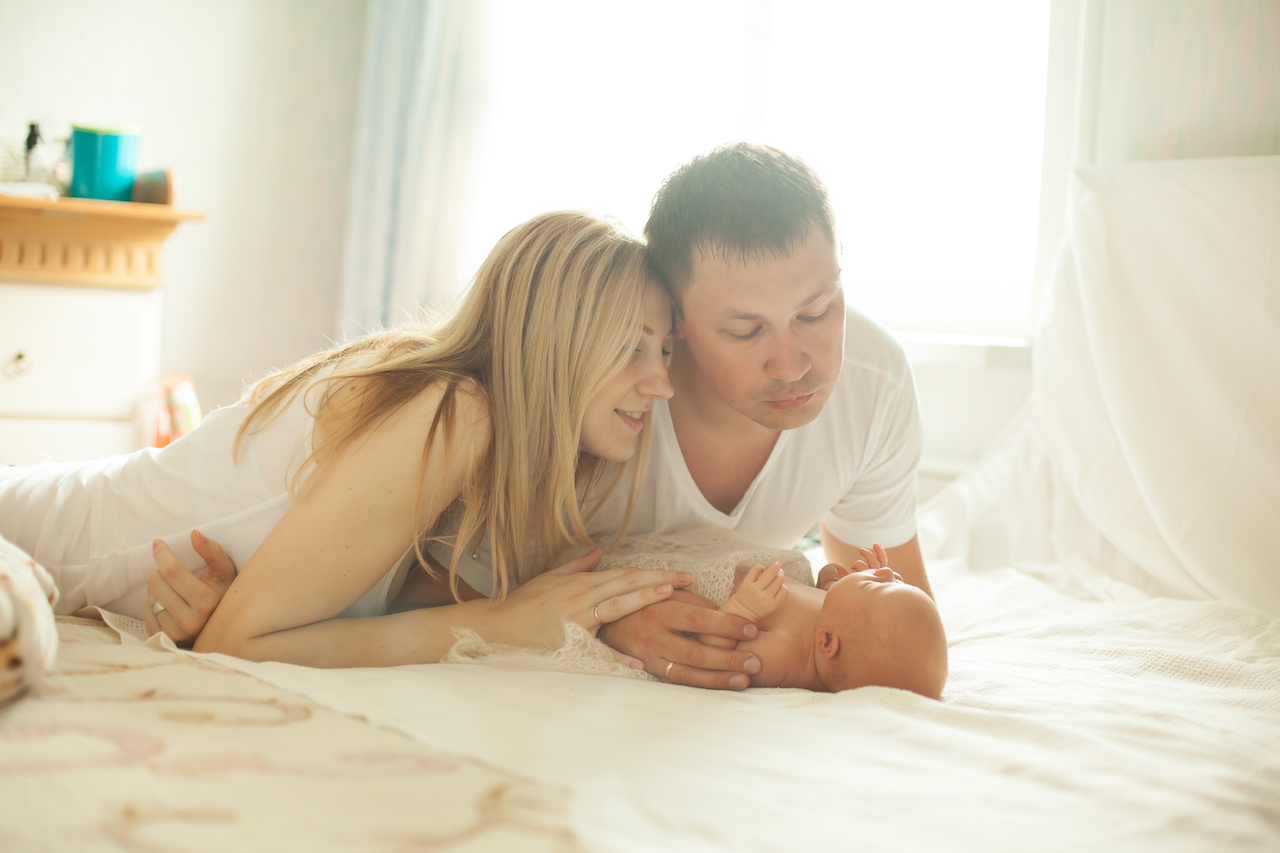
Keeping baby safe
Once you’re finally got your baby to sleep, the worries don’t end there. You’ll probably find yourself checking on your newborn regularly, mainly to make sure that she’s still breathing, isn’t too hot, or too cold… These are normal concerns for any new parent, and making sure that you know all the current safe sleep advice will hopefully help to reduce them over time.
One of the best places to go for all things ‘safe sleep’ is the brilliant Lullaby Trust website. The Trust was set up in 1971 to help raise awareness of sudden infant death syndrome (SIDS – formerly known as ‘cot death’) and provides advice to parents and health professionals on how to reduce the risk of SIDS through safe sleep practice. We’ve put a link to their website at the bottom of this page, where you can find loads of excellent resources, including downloadable factsheets and some great training videos which you might like to watch in preparation for becoming a new parent. Topics covered include: sleep position, beds and bedding, room temperature, co-sleeping, and environmental factors, such as smoking in the home.
Another good source of information, specifically for dads, is the #LiftTheBaby website. A joint initiative between the NHS and the London Irish RFC team, the website includes a summary of key safe sleep advice, supported by a great video:
The teams at the Hampshire and Isle of Wight Safeguarding Children Partnerships have also produced a fantastic safe sleep leaflet containing clear, straightforward advice for parents on safe sleep practice with their young babies. We’ve put a link to it, along with links to The Lullaby Trust and #LiftTheBaby resources, at the foot of this article.
Ten key tips on safe sleep from DadPad are:
- Baby should always be put BACK to sleep – research carried out in the 1980s has shown that the safest position for your baby to sleep in – at least until she is strong enough to roll from her tummy onto her back, and back again – is always on her back. You might be told by older relatives that they were advised to put baby to sleep on their fronts, but the advice has now changed. In fact, the change in advice in 1990 saw the amount of deaths from SIDS reduce from 1,545 UK cases in 1989 to just 647 cases in 1992.
- Baby should have their own, flat sleeping surface – The Lullaby Trust states that: “The safest place for your baby to sleep is on their own sleep surface, in the same room as you, for at least the first six months.” They recommend that this is in either a cot or a Moses basket, with a firm, flat mattress. The mattress should ideally have a wipeable waterproof cover and be in a good condition.
- Baby should be always be positioned FEET-TO-FOOT in their cot – always place baby towards the bottom of her cot, with her feet close to the foot. This reduces the risk of her being able to wiggle down and under her covers. You should also only cover baby in firmly tucked in sheets and blankets, which should never be above shoulder height, or put her in a baby safe sleeping bag.
- Baby’s cot should be kept clear – another possible factor in increasing the risk of SIDS is for baby’s head to become covered. To reduce the risk of this happening, it’s important to keep baby’s cot (or other sleeping location) clear of all unnecessary items. The Lullaby Trust therefore specifically recommend that you do NOT place any of the following in your baby’s cot: pillows; duvets; cot bumpers; soft toys; loose bedding; and products (such as sleep positioners, wedges, straps or even a rolled up blanket) which aim to keep baby in one sleeping position.
- Baby should not be left to sleep in a car seat for extended periods of time – SIDS-related research has found that allowing young babies to remain in an upright position in their car seat for too long could cause them breathing difficulties. Whilst it’s OK to leave baby to sleep in the car seat if she falls asleep on a journey, you should ideally: have another adult sitting in the back with baby, keeping an eye on her (or, if this is not possible, fitting a mirror so that you can monitor her from your driving position); stopping for regular breaks on a longer journey, to allow you to get baby out of her car seat for a stretch; and taking baby out of her car seat as soon as you reach your destination, moving her to a safer location (e.g. her cot or Moses basket) if she is still asleep. The general advice is never to leave baby in a car seat for more than two hours at a time and to stop your car IMMEDIATELY if you notice that baby has slumped forward in her seat, so that you can reposition her into a safer, more upright position.
- Never sleep on a sofa or armchair whilst holding your baby – this has been shown to be one of the most dangerous things that you can do, in terms of safe sleep. If you think you’re in danger of nodding off whilst holding your baby in this location, move her to a safer place. Further, if mum is breastfeeding late at night in a chair or on a sofa, sitting up with her to make sure that she stays awake is a great idea; she’ll also undoubtedly appreciate the company.
- Stop smoking – make sure that your baby is not exposed to cigarette smoke, as this also increases the risk of SIDS. Both mum and dad should stop smoking in pregnancy, if possible, and you should also make sure that no-one else smokes around your baby. If one or both parents does still smoke, you should not share your bed with your baby, even if you don’t smoke in the bedroom.
- Support mum to breastfeed your baby – there is good evidence to show that breastfeeding reduces the risk of SIDS for babies; in fact, breastfeeding baby for at least two months will reduce the risk of SIDS by half. We’ll be sharing blog posts during August on how you can support mum to breastfeed…
- Keep baby’s room at a safe temperature – the room in which baby will sleep should be kept at a not-too-hot and not-too-cold temperature, ideally between 16ºC and 20ºC. Allowing baby to get too hot also increases the risk of SIDS. Use a room thermometer, only use covers or baby sleeping bags that are appropriate for the season, and check baby’s temperature by feeling her chest or the back of her neck.
- Co-sleep safely – although the advice is that baby is always safest in her own bed space and in the same room as her parents, it’s inevitable that many of us will still choose or wish to c0-sleep with baby (that is, have baby in your bed with you). If this is something that you are thinking about, it’s essential that you take all necessary precautions in order to keep baby as safe as you can. There’s great advice on this on The Lullaby Trust’s website (link below), including a list of situations in which you should NEVER co-sleep.
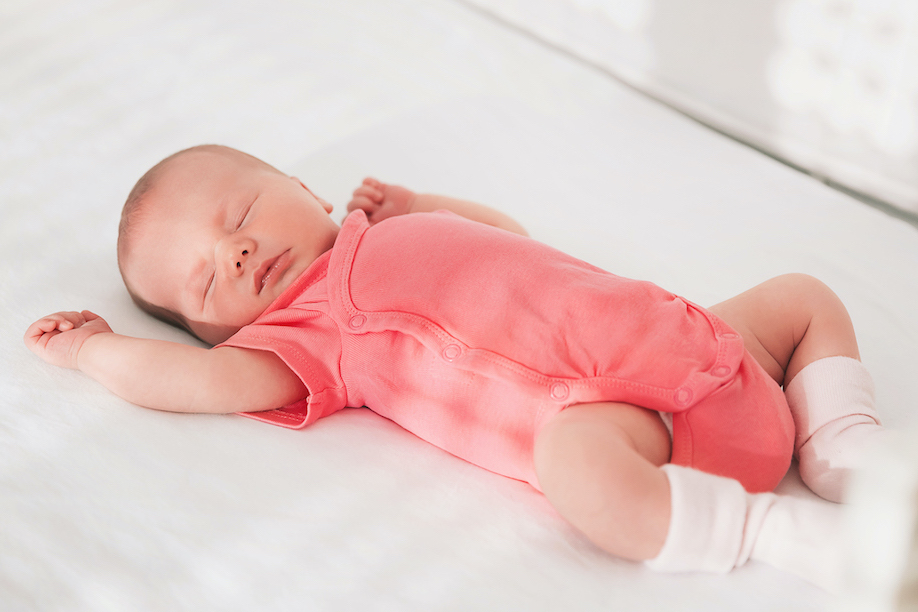
[NB. We selected this image as it shows a beautifully relaxed baby, sleeping safely on her back at the foot of her cot. The slim cot bumper just visible behind her, though, should be removed to ensure safe sleep practice.]
And just when you think you’ve got it sorted…
One final piece of advice is to remember that, as your baby continues to grow and develop, their need for sleep and their sleep pattern will continue to change. Things like teething, illness and growth spurts will all impact on their sleeping habits. Stay flexible, keep your expectations low, try and zone out when you hear others discussing their miraculous child who’s “slept through the night since Day One” (they probably haven’t…), keep reading around the subject if you want more advice – although remember to always use trusted, reliable sources – and just remember to keep enjoying every minute of your baby’s development.
Don’t forget, though, that if do you have concerns about any aspect of your baby’s sleep, do speak with your Health Visitor; dealing with sleep queries and worries are part of their work on a daily basis, and they will be able to listen and advise you appropriately.
Sources of advice, references and further reading:
The Lullaby Trust website, including:
- General safe sleep advice webpage, with an index of all the individual safe sleep advice pages
- Co-sleeping advice webpage
- Dedicated Little Lullaby webpage, specifically for young parents aged 25 and under
Hampshire and Isle of Wight Safeguarding Children Partnerships’ Every Sleep Counts leaflet
- If you’re a health professional, you might like to have a look at the resources available on their Every Sleep Counts toolkit website
NHS Helping your baby to sleep webpage
The Sleep Foundation article: What is Circadian Rhythm?
Information on The Fourth Trimester via Jo Lewitt, Cornwall Council
A little bit about our contributors…
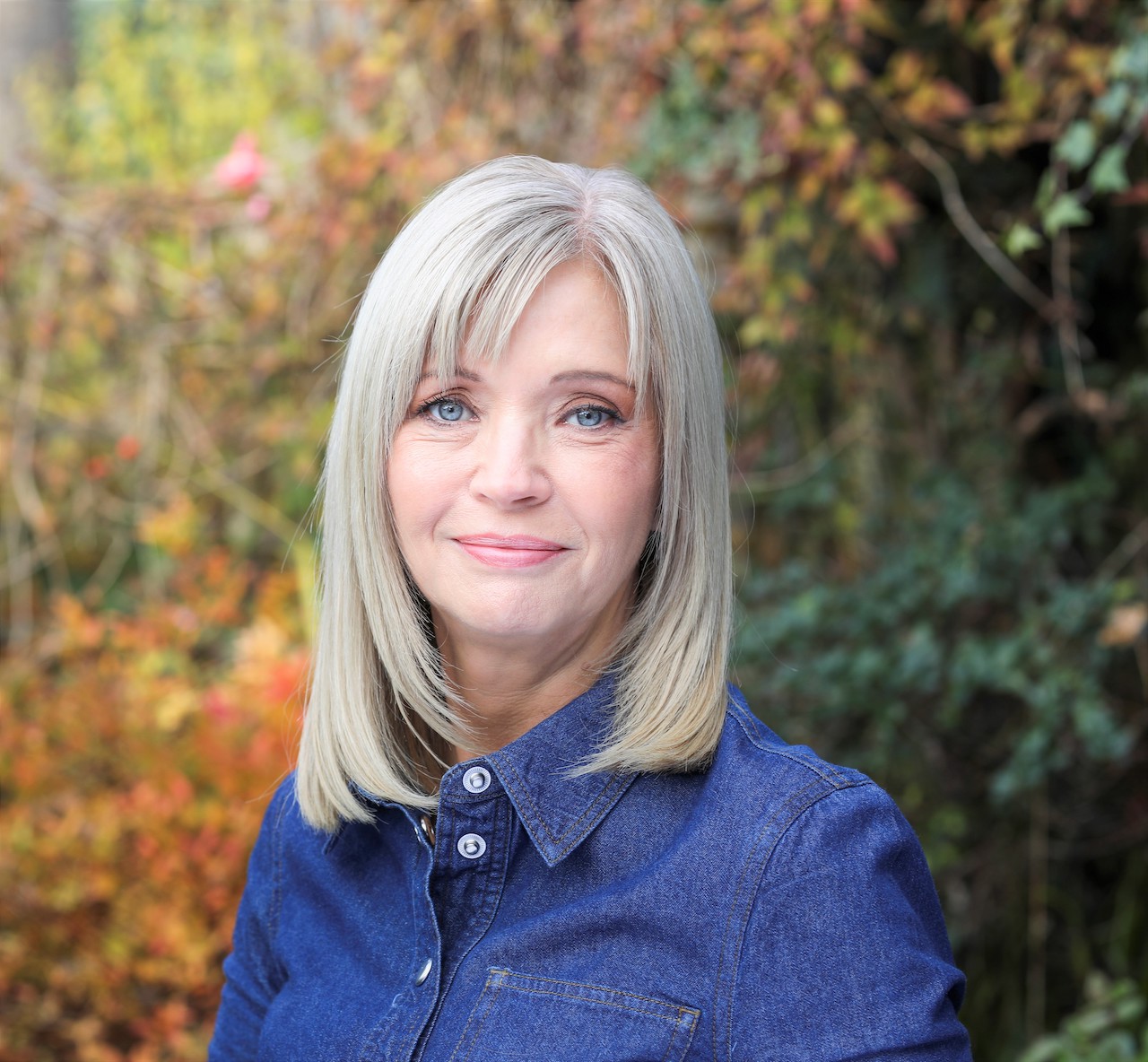
Mandy Gurney is a sleep consultant, Director of Millpond Children’s Sleep Clinic, and a mum of two. She initially trained as a nurse, then as a midwife and health visitor. She went on to set up Millpond in 2000.
Millpond was the first private clinic to specialise in babies’ and children’s sleep problems and is now the only private clinic to help children of school age; it has a reputation as the UK’s leading children’s sleep clinic. Millpond have been sleep advisors to the NHS since 2007 and provides regular national workshops to the NHS, Eire and the corporate sector across the UK.
Mandy is a keynote speaker and also writes and records podcasts for online parenting sites. She is frequently asked to give expert comment for national media and newspapers. She is the author of Teach Your Child to Sleep, which has been translated into 10 languages.

Jane Armstrong is a sleep consultant, working for Hunrosa. She’s the parent of two children, one of whom is disabled.
Jane has been qualified in sleep support for over 12 years, previously having worked for a charity supporting disabled children and their families. She trained at both Sleep Scotland and the Southampton Sleep Clinic, and recently achieved an OCN Level 6 qualification in Advanced Paediatric Sleep Practitioner Training. Jane’s expertise is in relation to infants and children with a disability; this involves one-to-one work with families, running workshops for parent carers and providing training for clinicians and NHS employees.
Hunrosa support people of all ages in achieving better sleep. They work with the NHS, local authority and schools, as well as supporting individuals in a private capacity.

